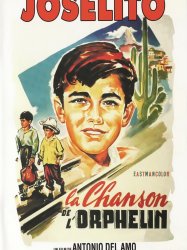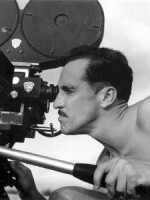René Cardona est un Acteur, Réalisateur, Scénariste, Producteur et Second Unit Director Cubain né le 9 octobre 1905 à La Havane (Cuba)

René Cardona (né le 8 octobre 1906 à La Havane, Cuba - mort le 25 avril 1988 à Mexico) est un acteur, réalisateur, scénariste, et producteur de cinéma mexicain. Il est le père de René Cardona Jr. et le grand-père de René Cardona III.
Film directing
After the success of Allá en el rancho grande (1936), the following year Cardona decided to direct his first film in Mexico, Don Juan Tenorio, in which he also starred. Although it was not a success, it did not stop Cardona. He directed Allá en el rancho chico (1938) and La reina del río (1939), debuting two future stars: Blanca Estela Pavón in the first and Susana Guízar in the second.
Shortly after he gave directed the stellar performances of Pedro Infante in Jesusita en Chihuahua (1942), and Germán Valdés "Tin Tan"]] in Hotel de verano (1944). In gratitude, both actors agreed to appear together only once in a Cardona film: También de dolor se canta (1952).
His career became so prolific that during 1937-1986, he directed more than one hundred films, in which he directed several of the biggest stars in Mexico. In the late fifties he made two films aimed at children, Pulgarcito (Tom Thumb) (1957) and Santa Claus (1959), which earned him several international awards. He directed many films in the 1960s which became cult classics, including Wrestling Women vs. the Aztec Mummy (1964), The Batwoman (aka La Mujer Murcielago) (1968) and the horror film Night of the Bloody Apes (1969).
In the seventies he produced and directed three films that achieved international success: La isla de hombres solos (1974), considered Cardon'a best film and based on the novel by José León Sánchez, El pequeño Robin Hood (1975), and Supervivientes de los Andes (1976).
Cardona directed his last film in 1982.
Acting
As an actor René also achieved prestige, was a founding member of the ANDA and twice nominated for an Ariel Award and acted in over 100 films, the most memorable are El secreto del sacerdote (1941), Caballería del imperio (1942), El Peñón de las Ánimas (1943), which marked the debut of María Félix, El abanico de Lady Windermere (1944), La barca de oro (1947), Soledad (1947) with Libertad Lamarque, Cartas marcadas (1948), with Pedro Infante and Marga López, La vorágine (1949) with Armando Calvo and Alicia Caro, Las tres perfectas casadas (1953) with Arturo de Córdova and Miroslava Stern among others, his career continued until shortly before his death and he even acted in a few films directed by his son, René Cardona, Jr. such as La casa que arde de noche (1985).
Last years and death
His last screen appearances were in the television series Rosa salvaje and the film El fiscal de hierro (1989). He was bestowed a life honor by the national film library of Mexico on 15 December 1986 and received from El Heraldo de Mexico in recognition of his 52 years of film work in the same year. He died in Mexico City on April 25, 1988.
Source : Wikidata
René Cardona

- Infos
- Photos
- Meilleurs films
- Famille
- Personnages
- Récompenses
Nom de naissance André René Cardona
Nationalité Cuba
Naissance 9 octobre 1905 à La Havane (Cuba)
Mort 25 avril 1988 (à 82 ans) à Mexico (Mexique)
Nationalité Cuba
Naissance 9 octobre 1905 à La Havane (Cuba)
Mort 25 avril 1988 (à 82 ans) à Mexico (Mexique)
Biographie
René Cardona was born in Havana, Cuba on October 8, 1905, and began medical school in Cuba, but due to the political problems of the island, he and his family moved to New York in 1926, where he continued his studies. Economic circumstances experienced by his family caused him to leave his studies. He befriended famous actor Rodolfo Valentino and obtained work as an extra in several films, until in 1929 he produced, wrote, directed and starred in the first Spanish-language film made in Hollywood, Sombras habaneras (Havana Shadows). He also had the opportunity to work in various positions in the film industry such as second assistant, technical advisor and first assistant director; and learned film and lighting technique. In 1932 he moved to Mexico, where he debuted as an actor and met Julieta Zacarías, sister of the director Miguel Zacarías, and soon after married her. His wife's support would be central to his career in Mexican cinema, in films Mano a Mano (1932) directed by Ramòn Peòn and Sobre las olas (1932) directed by Zacarìas. At this early stage as an actor, Cardona participated in three key Mexican films Marihuana (1936), El baúl macabro (1936) and Allá en el rancho grande (1936), which officially inaugurate the golden age of Mexican cinema and made stars of its protagonists: Esther Fernández, Tito Guízar, and Cardona.Film directing
After the success of Allá en el rancho grande (1936), the following year Cardona decided to direct his first film in Mexico, Don Juan Tenorio, in which he also starred. Although it was not a success, it did not stop Cardona. He directed Allá en el rancho chico (1938) and La reina del río (1939), debuting two future stars: Blanca Estela Pavón in the first and Susana Guízar in the second.
Shortly after he gave directed the stellar performances of Pedro Infante in Jesusita en Chihuahua (1942), and Germán Valdés "Tin Tan"]] in Hotel de verano (1944). In gratitude, both actors agreed to appear together only once in a Cardona film: También de dolor se canta (1952).
His career became so prolific that during 1937-1986, he directed more than one hundred films, in which he directed several of the biggest stars in Mexico. In the late fifties he made two films aimed at children, Pulgarcito (Tom Thumb) (1957) and Santa Claus (1959), which earned him several international awards. He directed many films in the 1960s which became cult classics, including Wrestling Women vs. the Aztec Mummy (1964), The Batwoman (aka La Mujer Murcielago) (1968) and the horror film Night of the Bloody Apes (1969).
In the seventies he produced and directed three films that achieved international success: La isla de hombres solos (1974), considered Cardon'a best film and based on the novel by José León Sánchez, El pequeño Robin Hood (1975), and Supervivientes de los Andes (1976).
Cardona directed his last film in 1982.
Acting
As an actor René also achieved prestige, was a founding member of the ANDA and twice nominated for an Ariel Award and acted in over 100 films, the most memorable are El secreto del sacerdote (1941), Caballería del imperio (1942), El Peñón de las Ánimas (1943), which marked the debut of María Félix, El abanico de Lady Windermere (1944), La barca de oro (1947), Soledad (1947) with Libertad Lamarque, Cartas marcadas (1948), with Pedro Infante and Marga López, La vorágine (1949) with Armando Calvo and Alicia Caro, Las tres perfectas casadas (1953) with Arturo de Córdova and Miroslava Stern among others, his career continued until shortly before his death and he even acted in a few films directed by his son, René Cardona, Jr. such as La casa que arde de noche (1985).
Last years and death
His last screen appearances were in the television series Rosa salvaje and the film El fiscal de hierro (1989). He was bestowed a life honor by the national film library of Mexico on 15 December 1986 and received from El Heraldo de Mexico in recognition of his 52 years of film work in the same year. He died in Mexico City on April 25, 1988.
Ses meilleurs films
Le plus souvent avec
Filmographie de René Cardona (61 films)
Acteur
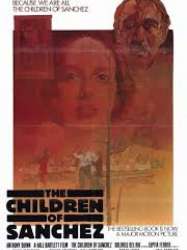
The Children of Sanchez (1978)
, 2h6Réalisé par Hall Bartlett
Origine Etats-Unis
Genres Drame
Acteurs Anthony Quinn, Lupita Ferrer, Katy Jurado, Dolores del Río, Stathis Giallelis, Héctor Bonilla
Note60%





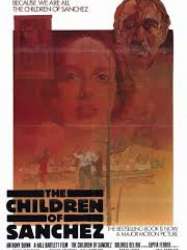
The Children of Sanchez (1978)
, 2h6Réalisé par Hall Bartlett
Origine Etats-Unis
Genres Drame
Acteurs Anthony Quinn, Lupita Ferrer, Katy Jurado, Helena Rojo, Dolores del Río, Patricia Reyes Spíndola
Note60%





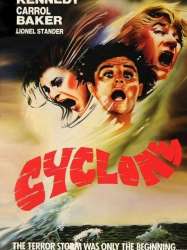
Cyclone (1978)
, 1h40Réalisé par René Cardona Jr.
Genres Horreur
Thèmes La mer, Transport, Film catastrophe, Catastrophe navale
Acteurs John Arthur Kennedy, Carroll Baker, Lionel Stander, Andrés García, Hugo Stiglitz, Mario Almada
Note48%





Durant un cyclone, un vol commercial qui survolait les Caraïbes s’écrase en mer. La plupart des survivants vont alors quitter la carcasse avant qu’elle ne sombre dans les eaux agitées. Récupérés à bord d’un petit navire qui passait par là, tout va bientôt tourner au cauchemar. La nourriture et l’eau viennent rapidement à manquer et les eaux sont infestées de squales affamés.
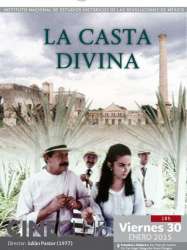
La casta divina (1977)
, 2hRéalisé par Julián Pastor
Genres Drame, Guerre, Historique
Acteurs Ignacio López Tarso, Ana Luisa Peluffo, Pedro Armendáriz (fils), Jorge Martínez de Hoyos, Tina Romero, Sergio Calderón
Rôle Consul Cubano
Note66%






El valle de los miserables (1975)
, 1h50Réalisé par René Cardona Jr.
Genres Drame, Thriller, Action, Aventure, Policier
Acteurs Mario Almada, Hugo Stiglitz, Ana Luisa Peluffo, Alma Muriel, Silvia Mariscal, Jorge Russek
Rôle Don Luis Aguirre
Note56%





In 1909, the former Judge Cristobal Zamarripa Zamarripa is the owner of the Valle Nacional, the a plantation where snuff exploits workers, supported by the tyrant Porfirio Diaz, who sends political prisoners as slaves. Others are engaged with the promise of high wages, but end up owing all to the company store. All are tortured, raped or killed when they protest. Another rancher (whose brother was killed by Zamarripa), will be punished, but flees and becomes revolutionary. The Zamarripa minions betray each other and they flee of the revolutionaries, led by fugitive landowner. The prisoners, upon release, massacred all the Zamarripa Family.
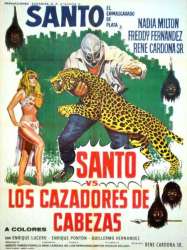
Réalisé par René Cardona
Genres Action, Aventure
Thèmes Super-héros
Acteurs El Santo, René Cardona
Note55%






Un novio para dos hermanas (1967)
Réalisé par Luis César Amadori
Genres Comédie, Musical
Acteurs Sara García, Pili y Mili, Ángel Garasa, Joaquín Cordero, Fernando Luján, Carlos Riquelme
Rôle Sr. Mateos
Note60%





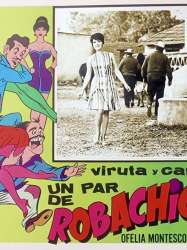
Un par de robachicos (1967)
, 1h20Réalisé par René Cardona Jr.
Genres Comédie, Aventure, Policier
Acteurs Marco Antonio Campos, Ofelia Montesco, René Cardona, Ramón Valdés
Note65%





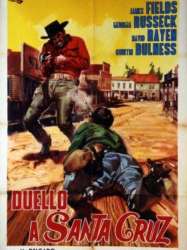
El revólver sangriento (1964)
, 1h38Réalisé par Miguel M. Delgado
Genres Drame, Action, Aventure, Western
Acteurs Lola Beltrán, Flor Silvestre, Emilio Fernández, René Cardona, Cuco Sánchez, Antonio Aguilar
Rôle Comisario
Note62%





The film opens in a cave with a close-up of Juan Chávez's (Luis Aguilar) silver-plated revolver as he glances at a "Wanted" poster that offers a reward, dead or alive, for his capture. A suspicious man follows Juan out of the cave, and traces him into a small town. There, he enters a bar called "La Patrona", whose bartender is Carmen (Lola Beltrán) who is infatuated with Juan. She serves him something to drink, and they converse, as a next scene focuses on a beautiful woman named Rosa (Flor Silvestre) who sings the song "Cariño bonito" as she waters her geraniums and watches her birds. At the end of her singing, her aunt (Emma Roldán) arrives at the house and tells her of Juan's return to the town. She replies that he came back for her to take her with him, and to prepare her clothes. When Rosa arrives at the bar, Juan responds to her coldly, and even depreciates her.
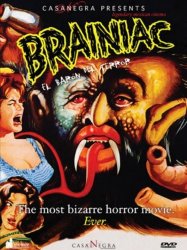
Le Baron de la terreur (1962)
, 1h17Réalisé par Chano Urueta
Origine Mexique
Genres Science-fiction, Horreur
Acteurs Abel Salazar, Ariadne Welter, David Silva, Germán Horacio Robles, René Cardona, Rubén Rojo
Rôle Baltasar de Meneses / Luis Meneses
Note50%





1661, au Mexique. Un baron est condamné à être brulé vif par le Saint-office pour sorcellerie, nécromancie, détournement de femmes respectables. Le jour de l'éxécution il lance une malédiction : dans 300 ans il jure de se réincarner pour se venger sur les descendants des juges qui l'ont condamné. Trois cent ans plus tard, à Mexico, débute une série de crimes.
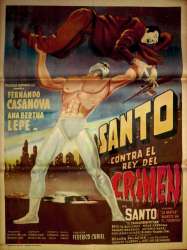
Réalisé par Federico Curiel
Genres Drame, Action
Thèmes Super-héros
Acteurs El Santo, Fernando Casanova, René Cardona, Alberto Mariscal
Rôle Sr. Roberto de la Llata
Note54%





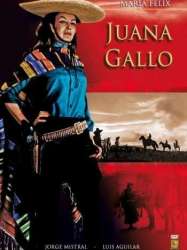
Juana Gallo (1961)
, 2hRéalisé par Miguel Zacarías
Genres Drame, Guerre, Action
Thèmes Politique
Acteurs María Félix, René Cardona Jr., Ignacio López Tarso, Jorge Mistral, René Cardona, Christiane Martel
Rôle Capitán Esquivel
Note68%






Bal de nuit (1959)
, 1h30Réalisé par Maurice Cloche
Origine France
Genres Drame, Comédie dramatique
Acteurs Pascale Audret, Claude Titre, Sophie Daumier, Micheline Francey, Roger Fradet, Jany Clair
Une jeune fille se retrouve à Paris après s'être enfuie de chez ses parents, mais la police la retrouve et la ramène chez elle. Elle va alors vivre chez son oncle, mais celui-ci tente de la séduire.
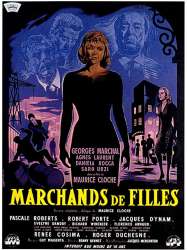
Marchands de filles (1957)
, 1h42Réalisé par Maurice Cloche, Jean-Pierre Decourt
Origine France
Genres Drame
Acteurs Georges Marchal, Agnès Laurent, Daniela Rocca, Saro Urzì, Pascale Roberts, Roger Duchesne
Note54%





Josette fuit la province où son beau-père la maltraite pour Paris. Sur place, elle rencontre une fausse aveugle qui la met en contact avec M. Jean...
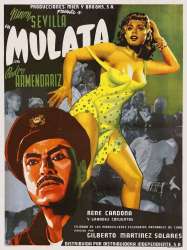
Mulata (1954)
, 1h20Réalisé par Gilberto Martínez Solares
Genres Drame
Thèmes La mer, Le racisme, Transport
Acteurs Ninón Sevilla, Pedro Armendáriz, René Cardona, Fanny Schiller
Rôle Guevara
Note60%





In the Havana port, two mulatto children, Mateo (Ricardo Román) and Caridad (Ninón Sevilla) grow together. She is the daughter of a white man who died in a shipwreck, and a black laundress of African origin. Over the years, Mateo falls for Caridad, but she is in love with a Mexican captain, Martin (Pedro Armendáriz), who accidentally met her at the port. The captain was also in love with Caridad and offers live together and she accepts. Caridad work in a cabaret in the port and the owner, Guevara (René Cardona), are attracted to the girl, and in a moment of jealousy, tries to kill Martin. Martin falls in financial trouble and have to mortgage his boat to Guevara. When Martin returns to Veracruz, Mexico, Guevara feels himself like the new owner of Caridad.
 Connexion
Connexion
